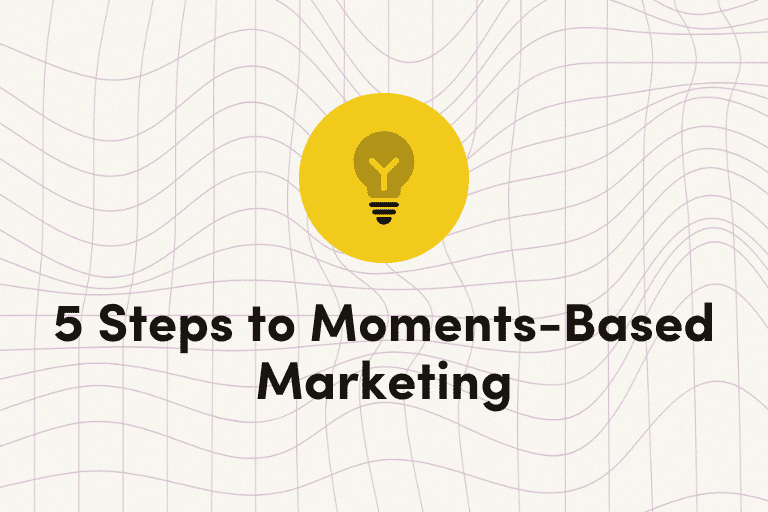Given the fact that subscription box websites have grown nearly 3,000% in the past three years, it can be difficult for businesses in this hot market to outshine the rest.
Yet, when it comes to innovative marketing campaigns, leading jewelry subscription service Rocksbox is a true gem.
Erin Miller, VP of Marketing at Rocksbox, recently spoke at our growth marketing conference Activate to share how her team scaled their business by utilizing a customer-centric and data-driven strategy.
Read on to learn how Rocksbox crushes customer data and uncovers success.
The 3 Tools Needed to Build Customer-Centric Campaigns
To transform the way that women discover and buy jewelry, Rocksbox considers technology as core to their business values. Their mission is to provide their members with a unique experience both online and offline.
They accomplish this mission by leveraging these three tools in the Rocksbox toolbox: multi-touchpoint data collection, customer segmentation, and personalization.
1. Multi-Touchpoint Data Collection
Capturing data in multiple, recurring ways strengthens Rocksbox’s user profiles. The journey of a Rocksbox customer is kicked off when she completes a personalized Style Survey, which is used to segment members based on their individual jewelry tastes.
Once a new customer takes the survey and purchases a subscription, the next step in her journey is creating a wish list. Rocksbox members can favorite pieces of jewelry that they want to see in their boxes, as well as leave direct feedback on previous boxes received.
This wish list completion helps stylists know which pieces are most loved and encourages customers to purchase pieces included in their set.
With over 1 million surveys taken to date, and 4 million wish lists generated, data collection is just the beginning.
When Rocksbox launched an email campaign targeted towards dislikes—specifically related to pieces received that were broken—their emails achieved a nearly 100% open rate.
This campaign demonstrated how Rocksbox could collect data from multiple touchpoints to better address the specific needs of their members, creating a ripple effect throughout the business that increased customer satisfaction.
2. Customer Segmentation
Multi-touchpoint data collection allowed for more sophisticated customer segmentation—a necessary tool to provide the optimal experience for members, whether they’re new on their journey or longtime subscribers.
Using Iterable, Rocksbox successfully created an automated campaign for new members who had joined in the past 60 days but had yet to purchase any jewelry. This campaign led nearly 40% of users to purchase a piece from their set delivered that month.
This targeted segmentation by membership age and purchasing behavior paid off by dramatically converting users and increasing their lifetime value.
3. Personalization
Rocksbox uses Iterable to ingest over 200 custom events based on subscriber behavior to deliver the right message at the right time.
The marketing team understands that personalization is key to driving loyalty and revenue, so customers are given VIP service across multiple channels:
- Web: A subscriber’s browsing experience is unique to her Style Survey, wish list and feedback.
- Email & SMS: Iterable enables a CRM strategy that is relevant to a member’s lifecycle.
- Offline: Every jewelry set is curated from wish list and stylist picks and delivered with a personalized note.
How Rocksbox Spotted a Diamond in the Rough
With insights gained from their Iterable-powered campaigns, Rocksbox uncovered the true diamond in the rough—their customer’s desire for even more choice. Incorporating choice seamlessly into her membership creates a personalized shopping experience across channels.
When a member receives at least one wish list piece in her set, her happiness with the service increases by 52%, so Rocksbox decided to make wish list fulfillment a primary business initiative.
By offering incentives for new members who added at least 30 items to their wish list, requests increased by 21%. Furthermore, to maintain engagement over time, wish list-driven emails are sent weekly announcing new designers and up-and-coming jewelry trends.
Wish list requests not only improve the customer experience, they also provide the merchandising team key insights into which styles are most popular, which support accurate forecasting and ordering of future inventory.
Takeaways to Crush It at Your Company
With the power of multi-touchpoint data collection, customer segmentation, and personalization, Rocksbox keeps their members coming back for more month after month.
Here’s how to apply their lessons learned to your business:
- Listen to your customer. Be deliberate about using your data and evolve your strategy over time. How can your data help you communicate better with your customers and create a personalized experience, unique to their journey?
- Be flexible with your segments. Once you’re truly listening to your customers, you’ll recognize how their behavior changes. Can you easily trigger messages targeted specifically to members who’ve subscribed in the past 60 days but have yet to make a purchase?
- Invest in the right technology. Your marketing stack should have the infrastructure required to support data flexibility and conduct sophisticated tests. Are your marketing campaigns limited by the functionality of your MarTech?
To learn more about Rocksbox’s marketing success story, check out their in-depth case study.
































